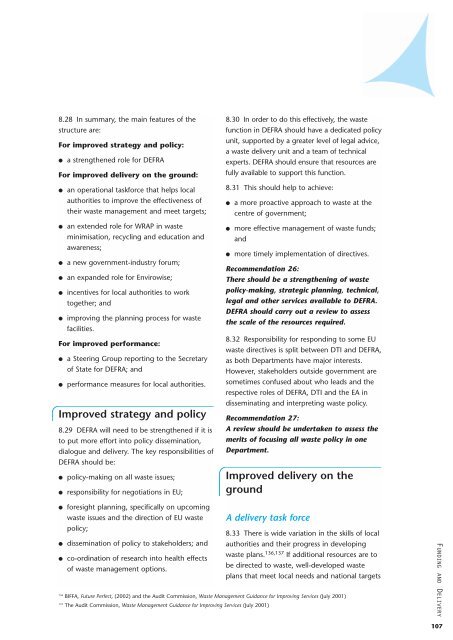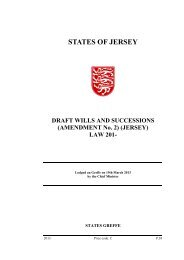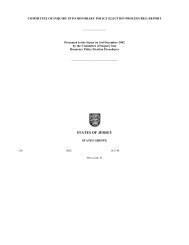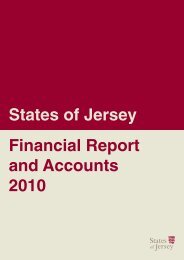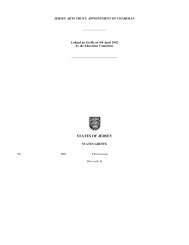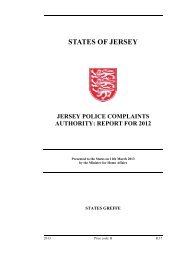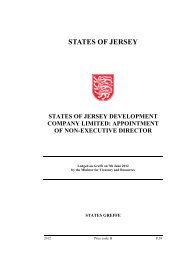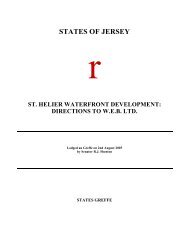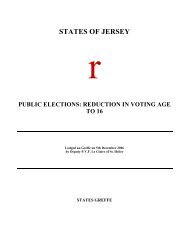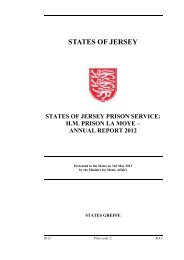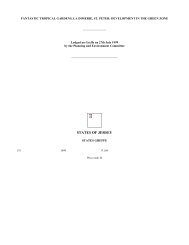Waste not want not - States Assembly
Waste not want not - States Assembly
Waste not want not - States Assembly
You also want an ePaper? Increase the reach of your titles
YUMPU automatically turns print PDFs into web optimized ePapers that Google loves.
8.28 In summary, the main features of the<br />
structure are:<br />
For improved strategy and policy:<br />
●<br />
a strengthened role for DEFRA<br />
For improved delivery on the ground:<br />
●<br />
●<br />
●<br />
●<br />
●<br />
●<br />
an operational taskforce that helps local<br />
authorities to improve the effectiveness of<br />
their waste management and meet targets;<br />
an extended role for WRAP in waste<br />
minimisation, recycling and education and<br />
awareness;<br />
a new government-industry forum;<br />
an expanded role for Envirowise;<br />
incentives for local authorities to work<br />
together; and<br />
improving the planning process for waste<br />
facilities.<br />
For improved performance:<br />
●<br />
●<br />
a Steering Group reporting to the Secretary<br />
of State for DEFRA; and<br />
performance measures for local authorities.<br />
Improved strategy and policy<br />
8.29 DEFRA will need to be strengthened if it is<br />
to put more effort into policy dissemination,<br />
dialogue and delivery. The key responsibilities of<br />
DEFRA should be:<br />
●<br />
●<br />
policy-making on all waste issues;<br />
responsibility for negotiations in EU;<br />
8.30 In order to do this effectively, the waste<br />
function in DEFRA should have a dedicated policy<br />
unit, supported by a greater level of legal advice,<br />
a waste delivery unit and a team of technical<br />
experts. DEFRA should ensure that resources are<br />
fully available to support this function.<br />
8.31 This should help to achieve:<br />
●<br />
●<br />
●<br />
a more proactive approach to waste at the<br />
centre of government;<br />
more effective management of waste funds;<br />
and<br />
more timely implementation of directives.<br />
Recommendation 26:<br />
There should be a strengthening of waste<br />
policy-making, strategic planning, technical,<br />
legal and other services available to DEFRA.<br />
DEFRA should carry out a review to assess<br />
the scale of the resources required.<br />
8.32 Responsibility for responding to some EU<br />
waste directives is split between DTI and DEFRA,<br />
as both Departments have major interests.<br />
However, stakeholders outside government are<br />
sometimes confused about who leads and the<br />
respective roles of DEFRA, DTI and the EA in<br />
disseminating and interpreting waste policy.<br />
Recommendation 27:<br />
A review should be undertaken to assess the<br />
merits of focusing all waste policy in one<br />
Department.<br />
Improved delivery on the<br />
ground<br />
●<br />
●<br />
●<br />
foresight planning, specifically on upcoming<br />
waste issues and the direction of EU waste<br />
policy;<br />
dissemination of policy to stakeholders; and<br />
co-ordination of research into health effects<br />
of waste management options.<br />
A delivery task force<br />
8.33 There is wide variation in the skills of local<br />
authorities and their progress in developing<br />
waste plans. 136,137 If additional resources are to<br />
be directed to waste, well-developed waste<br />
plans that meet local needs and national targets<br />
136<br />
BIFFA, Future Perfect, (2002) and the Audit Commission, <strong>Waste</strong> Management Guidance for Improving Services (July 2001)<br />
137<br />
The Audit Commission, <strong>Waste</strong> Management Guidance for Improving Services (July 2001)<br />
FUNDING AND DELIVERY<br />
107


